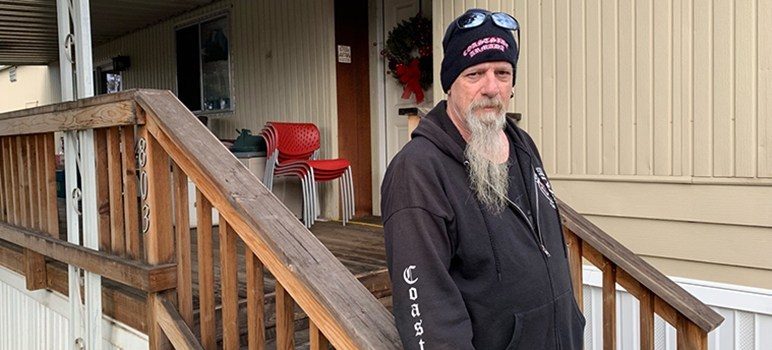Two months after residents at Westwinds Mobile Home Park found out they may be forced to leave in August 2022, the San Jose City Council will review strategies to preserve the community and others like it.
City leaders want to establish a new land use designation specifically for mobile home parks and apply it to two of them: Westwinds and Mountain Springs. Both parks sit on land that allows high-density apartments, which makes them vulnerable to conversion.
“City-initiated General Plan amendments to change the land use designations of mobile home parks would not directly prohibit mobile home park owners from closing their parks but could strengthen the protection of mobile home park residents by creating an additional transparent public land use entitlement process to redevelop the sites,” San Jose Planning Director Rosalynn Hughey wrote in a recent memo.
The new changes stem from a recent proposal by Mayor Sam Liccardo and Councilman Lan Diep who jumped into action after more than 700 families at Westwinds received warning letters that they may need to find a new place to live when the ground lease expires for the North San Jose property.
The park’s management company—MHC Operating—and the property owners, the Nicholson Family Partnership, are currently locked in a legal battle. MHC Operating initiated the suit, claiming that the owners want to illegally force residents out and use the swath of land for themselves. The Nicholson family, however, refuted the claim.
Besides changing the land use designation of Westwinds and Mountain Springs, city officials will begin reviewing whether to apply it to the remaining 56 parks in the city.
But Hughey says the process would be both timely and costly—ringing up an approximate bill of $318,800 to $381,600 and taking 12 to 18 months to complete.
Council members Sergio Jimenez, Raul Peralez, Maya Esparza and Pam Foley, however, are urging city officials to move forward with the new land use designation anyways. The group cited concern that the city has not done anything in the last two and a half years to protect mobile home park residents. In March 2016, the council approved a temporary moratorium on mobile home park conversion, but it expired in August 2017, leaving the naturally affordable housing, which is home to 10,000 residents in San Jose, vulnerable.
“Based on staffs estimates, we can preserve these nearly 10,000 additional naturally affordable homes for under $381,000—a cost of less than $40 a home,” Jimenez, Peralez, Esparza and Foley wrote in a memo ahead of the meeting. “Staff notes that this cost-estimate is inclusive of the associated rezoning work required for a minority of the 56 parks. That is roughly .03 percent of what the City typically spends to subsidize the production of an affordable home.”
Jimenez, Peralez, Esparza and Foley also want the city to include mobile home parks in its study of affordable housing preservation and anti-displacement strategies.
“We must act quickly to provide certainty and greater security to mobile home park residents and finish the work we started,” the councilors wrote. “Now is the time to properly designate our mobile home parks for what they are: valuable, affordable communities that contribute to the diversity and prosperity of San Jose.”
Diep, who represents the district that encompasses Westwinds, issued his own proposal before the Tuesday meeting, asking city officials to rank the remaining 56 mobile home parks by the risk of conversion. The North San Jose councilor also wants to create a mobile home protection reserve fund that would aid mobile home parks that are under immediate threat of conversion. Diep has asked that the action be taken as an alternative to changing the land use designation for the remaining 56 parks.
“We will continue to assure mobile home owners that they are a valued part of our city and that their investments in their homes will be protected,” he wrote in a Monday afternoon memo. “However, considering constraints on city finances and staff time, we must be judicious and nimble in our actions. The proposal to designate all existing mobile home communities from their current land uses to mobile home park sounds significant but in practice would not create any additional meaningful protections.”
Diep has asked to pre-approve $30,000 for the fund and would deduct that amount from his District 4 council office budget.
The San Jose City Council meets at 1:30pm Tuesday at City Hall, 200 E. Santa Clara St. Click here to read the entire agenda.


Diep’s proposal is just more delay. I suppose if I get a letter in the mail that my park is closing he would consider that an “immediate threat” and then advocating taking action. We need a representative in D4 that is on the side of the residents and affordable housing. Hopefully this will come to pass in November 2020.
“But Hughey says the process would be both timely and costly—ringing up an approximate bill of $318,800 to $381,600 and taking 12 to 18 months to complete.”
This is classic SJ city Hall thinking, or feelz’ing.
How about the loss in value of the land when this gets rezoned to MHP forever? Millions? It is zoned for development for a reason, the owners paid for that right when they bought it, and the information was available to the resident when they purchased the property. Its grown up time everyone.
If the city wants to protect these tenants, then eminent domain it. While annoying, that is a legitimate use of the provision if the public sees keeping these tenants from moving to AZ is public safety issue. This backhanded paper chase is regulatory taking, they know it, and is closer to theft than justice.